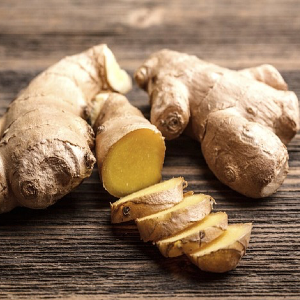Comparative effect of ginger (an anti-inflammatory medicinal herb) and aspirin (a non-steroidal anti-inflammatory drug) on cytoprotection and body weight changes in male albino Wistar rats

Accepted: November 16, 2022
All claims expressed in this article are solely those of the authors and do not necessarily represent those of their affiliated organizations, or those of the publisher, the editors and the reviewers. Any product that may be evaluated in this article or claim that may be made by its manufacturer is not guaranteed or endorsed by the publisher.
Nonsteroidal anti-inflammatory medicines (NSAIDs) are used to treat acute and chronic musculoskeletal problems (osteoarthritis, rheumatoid arthritis, and gout injuries), headaches, dental aches, surgical pains, and dysmenorrhea. Aspirin and other non-steroidal anti-inflammatory drugs (NSAIDs) can cause ulcers. Ginger, a common spice, is anti-inflammatory. Ginger's anti-inflammatory qualities make it suitable for the herbal treatment of inflammatory diseases in numerous cultures. This study examined the effects of ginger, an anti-inflammatory plant, and aspirin, a NSAID, on animal stomachs and body weight. Both are used to treat inflammatory conditions in various nations. Given that aspirin has been linked to stomach ulcers, the study sought to determine if ginger had a larger stomach cytoprotective impact. The study hopes to determine if ginger, a medicinal herb, might reduce inflammation and weight. This study used 45 male Wistar rats. Three 15-rat groups—Control, Ginger, and Aspirin—were created. Five (5) rats in each group were utilized to assess mucus, ulcer scores, and pepsin secretion from the 15 rats in each group. Three animal groups received food and water daily. For four weeks, ginger group mice received 150 mg/kg aqueous ginger extract, while aspirin group animals received 150 mg/kg aspirin. At the end of the trial, ginger group animals had considerably lower mucus secretion than the control and aspirin groups. At 0.05 significance difference, the ginger group's pepsin secretion was significantly higher than the control and aspirin groups, although the ulcer score was significantly higher in the aspirin group. Ginger and aspirin groups had lower body weight changes than the control group at 0.05 significant differences. Ginger may treat inflammatory diseases, according to ulcer scores, and decrease weight gain.
Ghlichloo I, Gerriets V. Nonsteroidal anti-inflammatory drugs (NSAIDs).StatPearlsPublishing; 2023
Malik TF, Gnanapandithan K, Singh K. Peptic ulcer disease. StatPearlsPublishing; 2023
Ozkur M, Benlier N, Takan I, et al Ginger for healthy ageing: A systematic review on current evidence of its antioxidant, anti-inflammatory, and anticancer properties. Oxid Med Cell Longev2022:4748447. DOI: https://doi.org/10.1155/2022/4748447
Fletcher J. Why Is Ginger Good For You? Medical News Today; 2020. Available from: from www.medicalnewstoday.com/article/265990
Lorke, D. A new approach to practical acute toxicity testing. Arch Toxicol 1983;54:275-87. DOI: https://doi.org/10.1007/BF01234480
Tan PV, Mezui C, Boda M. Anti-Helicobacter and gastroduodenalcytoprotective actions of the leaf aqueous extract of Ocimum suave (Lamiaceae). J Med Plants Res 2011;5:5958-66.
Alphin RS, Ward JW. An investigation of antihistaminic activity and gastric ulceration. Eur J Pharmacol 1969;6:61-6. DOI: https://doi.org/10.1016/0014-2999(69)90066-1
Shay H, Sun DC, Gruenstein M. A quantitative method for measuring spontaneous gastric secretion in the rat. Gastroenterology 1954;26:906-13. DOI: https://doi.org/10.1016/S0016-5085(54)80008-4
Chen DM, Zhang ML, Shi ZQ, et al. Anti-inflammatory and anti-infectious dietary paradigms may be crucial for visceral weight reduction. Front Immunol 2019;10:422. DOI: https://doi.org/10.3389/fimmu.2019.00422
Thorpe W, Lamoreux K. 10 Natural Ways to Lower Your Cholesterol Levels. 2021. Available from:https://www.healthline.com/nutrition/how-to-lower-cholesterol
Osabor VN, Bassey FI, Umoh UU. Phytochemical screening and quantitative evaluation of nutritional values of Zingiberofficinale (Ginger). Am ChemSci J 2015;8:1-6. DOI: https://doi.org/10.9734/ACSJ/2015/16915
Sembuligam K, Sembulingam P. Essentials of Medical Physiology: Jaypee Brothers Medical Publishers. New Delhi;2012. DOI: https://doi.org/10.5005/jp/books/11696_42
Gaskill 3rd HV, Sirinek KR, Levine BA. Prostacyclin-mediated gastric cytoprotection is dependent on mucosal blood flow. Surgery 1982;92:220-5.
Copyright (c) 2023 the Author(s)

This work is licensed under a Creative Commons Attribution-NonCommercial 4.0 International License.
PAGEPress has chosen to apply the Creative Commons Attribution NonCommercial 4.0 International License (CC BY-NC 4.0) to all manuscripts to be published.


 https://doi.org/10.4081/jbr.2023.10633
https://doi.org/10.4081/jbr.2023.10633



